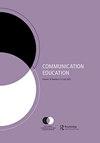Profiles of achievement motivation and instructional dissent
IF 0.8
Q3 COMMUNICATION
引用次数: 0
Abstract
ABSTRACT We integrated perspectives from achievement goal theory and expectancy-value theory to investigate how undergraduate students’ (N = 475) achievement motivation might influence their instructional dissent. A latent profile analysis of students’ achievement goals, performance self-efficacy, task value, and perceived cost revealed four distinct subgroups of students characterized by differences in their achievement motivation. Students between these latent profiles differed to some degree in their use of expressive and vengeful dissent but not rhetorical dissent. When examining instructor clarity as a triggering agent of dissent, lack of clarity was positively associated with all three types of instructional dissent; however, auxiliary moderation models revealed that latent profile membership did not moderate these effects. Our results suggest that although instructor clarity has similar effects on students’ instructional dissent—regardless of their latent profile membership—students still experience some differences in instructional dissent which can be explained by their achievement motivation profiles.成就动机与教学异议之研究
摘要本研究整合成就目标理论和期望价值理论的视角,探讨大学生成就动机对教学异议的影响。通过对学生成就目标、绩效自我效能感、任务价值和感知成本的潜在特征分析,揭示了学生成就动机差异的四个不同亚组。这些潜在特征的学生在表达性和报复性异议的使用上存在一定程度的差异,但在修辞性异议的使用上没有差异。当考察教师清晰性作为异议的触发因素时,缺乏清晰性与所有三种类型的教学异议都呈正相关;然而,辅助调节模型显示,潜在轮廓隶属度并没有调节这些影响。我们的研究结果表明,尽管教师的清晰性对学生的教学异议具有相似的影响,但学生在教学异议方面仍然存在一些差异,这可以通过他们的成就动机特征来解释。
本文章由计算机程序翻译,如有差异,请以英文原文为准。
求助全文
约1分钟内获得全文
求助全文
来源期刊

COMMUNICATION EDUCATION
EDUCATION & EDUCATIONAL RESEARCH-
CiteScore
3.10
自引率
34.80%
发文量
47
期刊介绍:
Communication Education is a peer-reviewed publication of the National Communication Association. Communication Education publishes original scholarship that advances understanding of the role of communication in the teaching and learning process in diverse spaces, structures, and interactions, within and outside of academia. Communication Education welcomes scholarship from diverse perspectives and methodologies, including quantitative, qualitative, and critical/textual approaches. All submissions must be methodologically rigorous and theoretically grounded and geared toward advancing knowledge production in communication, teaching, and learning. Scholarship in Communication Education addresses the intersections of communication, teaching, and learning related to topics and contexts that include but are not limited to: • student/teacher relationships • student/teacher characteristics • student/teacher identity construction • student learning outcomes • student engagement • diversity, inclusion, and difference • social justice • instructional technology/social media • the basic communication course • service learning • communication across the curriculum • communication instruction in business and the professions • communication instruction in civic arenas In addition to articles, the journal will publish occasional scholarly exchanges on topics related to communication, teaching, and learning, such as: • Analytic review articles: agenda-setting pieces including examinations of key questions about the field • Forum essays: themed pieces for dialogue or debate on current communication, teaching, and learning issues
 求助内容:
求助内容: 应助结果提醒方式:
应助结果提醒方式:


